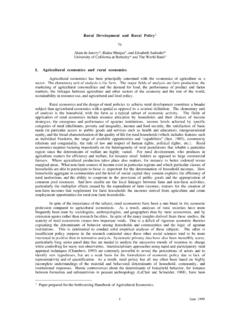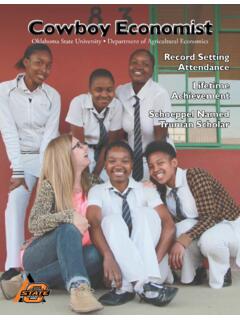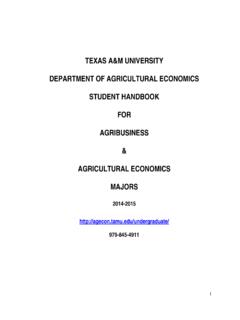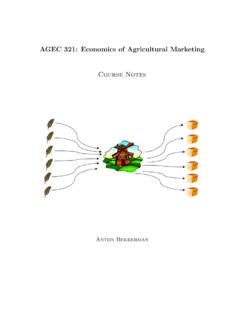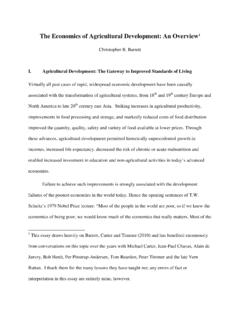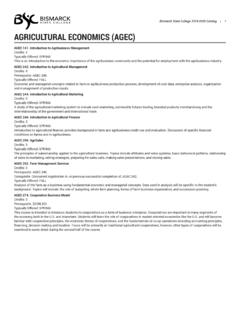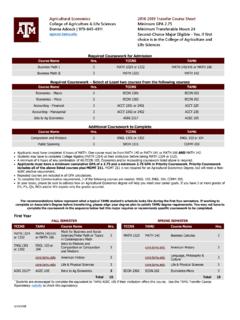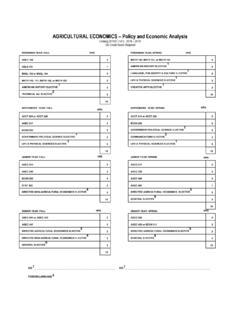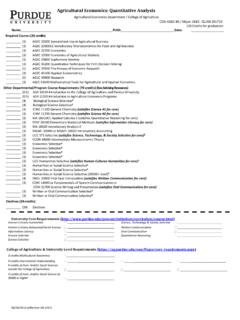Transcription of Department of Agricultural and Applied Economics Graduate ...
1 1. Department of Agricultural and Applied Economics Graduate Student Policy and Procedures Academic Year 2016 2017. All earlier versions of this statement are considered null and void. All current students must adhere to the policies contained in this document. 2. Department Head Octavio Ramirez 301 Conner, (706) 542-2481, Administrative Specialist (Office Manager). JoAnne Norris 301 Conner, (706) 542-2481, Graduate Committee Susana Ferreira 313 Conner, (706) 542-0086, Esendugue Greg Fonsah 301 Tift Bldg,Tifton (229) 386-3512, Jeff Jordan Griffin (770) 228-7230, Berna Karali 315 Conner, (706) 542-0750, Jeff Mullen, Graduate Coordinator 315 Conner, (706) 542-0767, Graduate Program Administrator Laura Alfonso 304 Conner, (706) 542-0744, MAB Committee Joshua Berning, Director 208 Conner, (706) 542-0768, Brady Brewer 313 Conner Hall, (706) 542-2632, Ben Campbell 314 Conner Hall, (706) 542-0852, Cesar Escalante 313 Conner, (706)542-0740, Communications Committee Chair Susana Ferreira 313 Conner, (706) 542-0086, Computer Support Chris Peters 320 Conner, (706) 542-0736, Reference Room Librarian Laura Alfonso 304 Conner, (706) 542-0744, Graduate School Website/ Department Website 3.
2 Graduate Student Policy and Procedures Department of Agricultural and Applied Economics PREFACE .. 4. History .. 4. Department of Agricultural and Applied Economics .. 4. Department 's Graduate 4. Graduate School's Policy and Procedures .. 5. Professionalism and Ethics .. 5. Academic Honesty .. 5. Admission .. 5. Programs of Study .. 6. Departmental 6. Financial Assistance .. 6. Length of Time and Remuneration .. 7. Work Schedule .. 8. Agricultural and Applied Economics Graduate Student Association .. 8. Department Services Available to Graduate Students .. 8. Supplies .. 8. Use of Departmental Equipment .. 9. Telephones .. 9. Exit Interviews .. 9. Research Collaboration .. 9. Degree Programs .. 10. Prerequisites .. 10. Advisory Committee .. 10. Program of Study .. 11. Sample of First Fall Semester Courses .. 11. Degree in Agricultural & Applied Economics .
3 13. Specific Course Requirements ..13. Degree in Environmental Economics .. 14. Specific Course Requirements ..14. Check List for Degree .. 15. Degree .. 16. Curriculum Requirements .. 16. Prerequisites 16. Program of Study .. 16. Sample of First Fall Semester Courses .. 17. Requirements ..17. Check List for Degree .. 19. Degree .. 20. Advisory Committee ..20. Requirements .21. Seminars .22. Examinations for the .. 22. Written Comprehensive QualifyingExaminations. 23. Oral Comprehensive Qualifying Examination 24. Admission to 25. Final Oral Examination/Defense .. 26. Sample Curriculum .. 27. Check List for Degree .. 29. 4. PREFACE. The Graduate Student Policy and Procedures handbook is provided as a supplement to the Graduate School Bulletin and should be referred to for all Graduate student policy and procedural matters approved and established by the faculty in the Department of Agricultural and Applied Economics .
4 It should be emphasized that this document is not intended to duplicate material provided in other Graduate School documents. Students should continue to refer to the Graduate School Bulletin for all university policy and procedural matters. As a complement to the university's policy and procedures, this document describes unique departmental policy and procedures1. History Department of Agricultural and Applied Economics The Department was organized in 1928, and during its early years the faculty was small, varying from two to five members. Due to a lack of funding, the Department was closed in 1933 and Agricultural Economics classes were offered in the Franklin College Department of Commerce. A year later, the Department was reestablished in the College of Agriculture and the faculty began to grow, expanding roles into research, outreach, and Graduate education.
5 Department 's Graduate Programs After World War II, the program greatly expanded with the influx of military veterans and has continued throughout its existence to be a very active and solid program. In 1971, the program was established, offering a strong complement to the , research, and outreach programs within the Department . In 1999, the was split into an in Agricultural Economics and an in environmental Economics . This was followed in 2009 with the establishment of the Masters in Agribusiness degree. 1. As changes to this document may occur in the future, students should refer to the handbook associated with the academic year in which they were admitted to their current degree objective. Students may also follow the policies and procedures of a handbook associated with a subsequent academic year. 5. Graduate School Policy and Procedures Refer to the Graduate School Bulletin and the Graduate School's web site ( ) for all university policy, procedures, and Graduate School forms.
6 Department policy and procedures outlined below do not override any of the university's. Instead they are designed to supplement university policy. It is the responsibility of the student to meet all university and Department requirements. Professionalism and Ethics Academic Honesty The University of Georgia seeks to promote and ensure academic honesty and personal integrity among students and other members of the University community. All students at The University of Georgia are expected to read and comply with A Culture of Honesty, the University's academic honesty policy. A student participating in any dishonest activity will be subjected to academic dismissal. Any form of cheating on examinations or plagiarism will not be tolerated. Admission For admission the following are sent to the Graduate School: Admission application Current resume Statement of Purpose Transcripts from all colleges and universities attended Graduate Record Examination (GRE) scores Three letters of reference International students must also submit official TOEFL or IELTS scores that satisfy the Graduate School minimum requirements2.
7 All of these factors are taken into account by the departmental Graduate Committee as it considers an application. 2. Applicants who have received degrees from accredited institutions in the or from institutions in countries where English is the primary language usually are not required to submit the TOEFL (or IELTS) scores. See English Proficiency Requirement for details. 6. Programs of Study The Graduate programs in Agricultural and Applied Economics offer considerable flexibility in meeting individual student interests and backgrounds so students can prepare for careers in industry, government, or academia. As a foundation for this preparation, all students first obtain a core understanding of economic theory and quantitative skills. Based on this core, student programs are then designed on the individual research topics and interests of students.
8 This results in all students acquiring the following tools once they complete their degree programs: 1. Proficiency in problem-solving methodology (research methods) including professional ethics. 2. Ability to apply economic theory and quantitative techniques to the analysis and solution of contemporary problems and issues. 3. Proficiency in conducting independent research and the development of a high order of independent thought. 4. Capacity to read, synthesize, and critically evaluate literature in Economics . 5. Ability to work and communicate effectively with diverse groups and audiences. 6. Broad knowledge base and understanding of Applied Economics . Departmental Seminars The Department conducts a seminar program during the regular school year. Seminars are usually held at a regular scheduled date and time each semester.
9 Graduate students are required to register for one credit hour of seminar each fall and spring semester during their Graduate program. In addition, each student is required to present individual seminars related to his or her thesis or dissertation plans or results. Financial Assistance Funds are available through the Department for research or teaching assistantships. An application for an assistantship should be submitted to the Graduate coordinator. Research assistantships are for research support and relate directly to the research program of the Department . These assistantships represent both an opportunity and a responsibility for the recipient. The Department is sensitive to the dual roles of a Graduate assistant as both a student and a temporary university employee. Graduate assistantships offer a 7. professional, productive, and rewarding component of the total academic program and experience of a Graduate student.
10 They contribute both to the educational goals of a Graduate student and the research, teaching, and extension programs of the Department . MS, MAB, and PhD students receiving financial assistance may be assigned to serve as teaching assistants, depending on the needs of the Department . MS. and MAB students should expect to serve as a teaching assistant for at least one semester, while PhD. students should expect to serve as a teaching assistant for at least 2 semesters. First year Graduate student assistants are assigned by the Department head to a temporary advisor during their first semester. Such assignments may involve short-term projects or tasks, including acting as a teaching assistant or supervising the undergraduate computer lab, depending on the current demands facing the faculty. The Department head will make an effort to place Graduate students with a faculty member who is experienced and knowledgeable in a student's primary field of academic interest.
